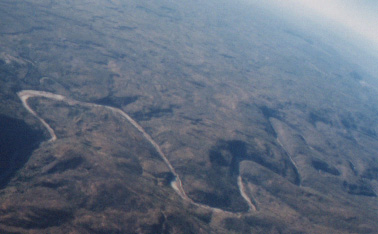Navigating the site:
Benjamin Kline,
First Along the River
 |
||
|
The
Kalahari desert stretch of the Zambezi River in Africa |
||
"If we ignore history we are bound to repeat the mistakes of the past...but knowledge alone will not help us avoid those mistakes."
Page, ix.
"If there is a message for environmentalists today, it is that they have to remind Americans that the protection of the environment is everybody's concern, that the danger has not been alleviated, and that constant vigil is necessary."
Page, 142.
"Western society assumes that humanity and nature are essentially disconnected and that the environment is subordinate to human needs. As a result, Western history is the story of struggle and gradual domination of nature by people."
The windmill seen here in northeastern Russia is built out of wood and is but one example of the repetitive manifestations in the western world of human technological conquest of the native elements which constitute the material world. It is the personal transformation of this material world that Kline refers to over and over again to support his thesis that our past "is the story of struggle and gradual domination of nature" by human appetites, behavior and consumption.
 "The decade following Earth Day
celebration witnessed an unprecedented surge in environmental legislation
as the public responded to environmental disasters.... Air and water pollution,
endangered wildlife, and the use of natural resources became public concerns."
"The decade following Earth Day
celebration witnessed an unprecedented surge in environmental legislation
as the public responded to environmental disasters.... Air and water pollution,
endangered wildlife, and the use of natural resources became public concerns."
"humanity had the power to disrupt and destroy the 'entire fabric of life on the planet ' and this power must be necessarily controlled."
Donald Worster
quoted on p. 88.
Overview
"Western European culture had developed a philosophy toward nature that emphasized materialism and humanity's right to dominate its environment.... expanded on the basis of either biblical interpretation or scientific reasoning."
pages, 10-11.
"The values and attitudes these Euro-Americans displayed during the colonial period set a precedent for how nature should be treated that continues to influence both pro- and anti-environmentalists to this day."
Page, 12.
"The colonists' relationship to nature was patterned significantly on the experiences they had in the Old World. Yet their experiences with the vast and abundant American wilderness in the New World also shaped their views of nature."
Page, 26.
"During the nineteenth century, scientific exploration and technological achievement grew rapidly worldwide, causing the Industrial Revolution and its accompanying disruption of traditional social patterns and values."
a "period of industrialization and mass consumption."
Page, 38
"A new view of nature had appeared."
"correcting reckless habits of the past"
"the 'never-ending West' had ended"
page, 53.
"The environmental movement in the United States became a popular public consideration during the progressive era. Leading figures such as Teddy Roosevelt, Gifford Pinchot and John Muir helped make conservation and preservation national issues."
Page, 70.
"Environmental costs of scientific progress"
- "The Age of Ecology began on the desert outside Alamogordo, New Mexico, on July 16, 1945." -- test explosion of the atomic bomb, later dropped on Japan.
-
Page, 73-74.
"The 1980s marked a reversal in the movement toward environmental protection. The energy crisis of the 1970s and the Reagan Revolution of the 1980s demonstrated that environmental issues,... were subordinate in the public mind to material living standards and economic security."
p. 104.
"The environmental movement in the United States, as it moves toward the millennium, suffers from government retrenchment and public apathy. The economy and human needs are paramount issues."
p. 120.
"The greatest accomplishment of the conservation movement has been to make the environment an intimate part of what America cares about."
Mary Cooper.
p. 142.
Benjamin Kline, First Along the River (San Francisco: Acada Books, 1997) (ISBN 0-9655029-0-2)


